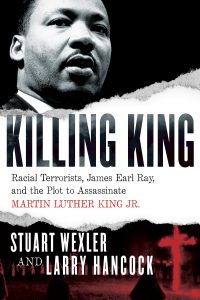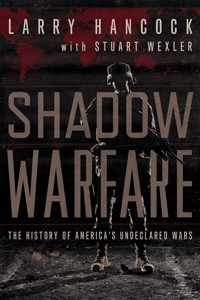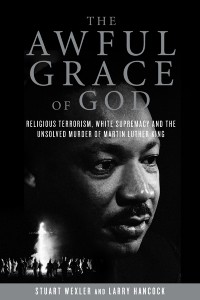Larry Hancock
Larry Hancock is considered one of the top investigative researchers in the areas of intelligence and national security. He is the author of four books, including Nexus: The CIA and Political Assassination, and coauthor of The Awful Grace of God, a study of religious terrorism, white supremacy, and the murder of Martin Luther King Jr. Hancock's books have received endorsements and praise from former House Select Committee of Investigations staff members and the former Joint Historian for the State Department and Central Intelligence Agency. He lives in Oklahoma.
Stuart Wexler is coauthor of The Awful Grace of God. His work has been featured in the The Boston Globe, USA Today, and on NBC News. Wexler's work on forensics and historical crimes helped win him a national award from the American Statistical Association in 2008. He lives in New Jersey.
Books
Killing King
Racial Terrorists, James Earl Ray, and the Plot to Assassinate Martin Luther King Jr.
Published in time for the 50th anniversary of Dr. Martin Luther King Jr.’s assassination, Killing King uncovers previously unknown FBI files and sources, as well as new forensics to convincingly make the case that King was assassinated by a long–simmering conspiracy orchestrated by the racial terrorists who were responsible for the Mississippi Burning murders.This explosive book details the long–simmering effort by a group of the nation’s most violent racial terrorists to kill Dr. Martin Luther King Jr. Killing King convincingly makes the case that while James Earl Ray was part of the assassination plot to kill King, the preponderance of evidence also demonstrates a clear and well–orchestrated conspiracy.
Thoroughly researched and impeccably documented, the book reveals a network of racist militants led by Sam Bowers, head of the White Knights of the Ku Klux Klan of Mississippi, who were dedicated to the cause of killing King. The White Knights were formed in the cauldron of anti–integrationist resistance that was Mississippi in the early 1960s and were responsible for more than three hundred separate acts of violence, including the infamous Mississippi Burning murders. The authors have located previously unknown FBI files and sources that detail a White Knight bounty offer, information from an individual who carried money for the assassination, and forensics information regarding unmatched fingerprints and an audio recording of an admission that a key suspect obtained a weapon to be used in killing King.
For years, Americans have debated issues with this crime. With Killing King, we are ever closer to an accurate understanding of how and why Dr. King was killed.
Surprise Attack
From Pearl Harbor to 9/11 to Benghazi
Surprise Attack explores sixty plus years of military and terror threats against the United States. It examines the intelligence tools and practices that provided warnings of those attacks and evaluates the United States' responses, both in preparedness – and most importantly – the effectiveness of our military and national command authority.Contrary to common claims, the historical record now shows that warnings, often very solid warnings, have preceded almost all such attacks, both domestic and international. Intelligence practices developed early in the Cold War, along with intelligence collection techniques have consistently produced accurate warnings for our national security decision makers. Surprise Attack traces the evolution and application of those practices and explores why such warnings have often failed to either interdict or intercept actual attacks.
Going beyond warnings, Surprise Attack explores the real world performance of the nation's military and civilian command and control history – exposing disconnects in the chain of command, failures of command and control and fundamental performance issues with national command authority.
America has faced an ongoing series of threats, from the attacks on Hawaii and the Philippines in 1941, through the crises and confrontations of the Cold War, global attacks on American personnel and facilities to the contemporary violence of jihadi terrorism. With a detailed study of those threats, the attacks related to them, and America's response, a picture of what works – and what doesn't – emerges. The attacks have been tragic and we see the defensive preparations and response often ineffective. Yet lessons can be learned from the experience; Surprise Attack represents a comprehensive effort to identify and document those lessons.
Shadow Warfare
The History of America's Undeclared Wars
Contrary to its contemporary image, deniable covert operations are not something new. Such activities have been ordered by every president and every administration since the Second World War. In many instances covert operations have relied on surrogates, with American personnel involved only at a distance, insulated by layers of deniability.Shadow Warfare traces the evolution of these covert operations, detailing the tactics and tools used from the Truman era through those of the contemporary Obama Administrations. It also explores the personalities and careers of many of the most noted shadow warriors of the past sixty years, tracing the decade–long relationship between the CIA and the military.
Shadow Warfare presents a balanced, non–polemic exploration of American secret warfare, detailing its patterns, consequences and collateral damage and presenting its successes as well as failures. Shadow Wars explores why every president from Franklin Roosevelt on, felt compelled to turn to secret, deniable military action. It also delves into the political dynamic of the president's relationship with Congress and the fact that despite decades of combat, the U.S. Congress has chosen not to exercise its responsibility to declare a single state of war – even for extended and highly visible combat.
The Awful Grace of God
Religious Terrorism, White Supremacy, and the Unsolved Murder of Martin Luther King, Jr.
The Awful Grace of God chronicles a multi–year effort to kill Martin Luther King Jr. by a group of the nation's most violent right–wing extremists. Impeccably researched and thoroughly documented, this examines figures like Sam Bowers, head of the White Knights of the Ku Klux Klan of Mississippi, responsible for more than three hundred separate acts of violence in Mississippi alone; J.B. Stoner, who ran an organization that the California attorney general said was "more active and dangerous than any other ultra–right organization;" and Reverend Wesley Swift, a religious demagogue who inspired two generations of violent extremists.United in a holy cause to kill King, this network of racist militants were the likely culprits behind James Earl Ray and King's assassination in Memphis on April 4th, 1968.
King would be their ultimate prize—a symbolic figure whose assassination could foment an apocalypse that would usher in their Kingdom of God, a racially "pure" white world.
Hancock and Wexler have sifted through thousands of pages of declassified and never–before–released law enforcement files on the King murder, conducted dozens of interviews with figures of the period, and re–examined information from several recent cold case investigations. Their study reveals a terrorist network never before described in contemporary history. They have unearthed data that was unavailable to congressional investigators and used new data–mining techniques to extend the investigation begun by the House Select Committee on Assassinations.
The Awful Grace of God offers the most comprehensive and up–to–date study of the King assassination and presents a roadmap for future investigation.

Catapult | Counterpoint | Soft Skull
20 Jay Street #704
Brooklyn, NY 11201
646.926.0805 | contact@catapult.co








